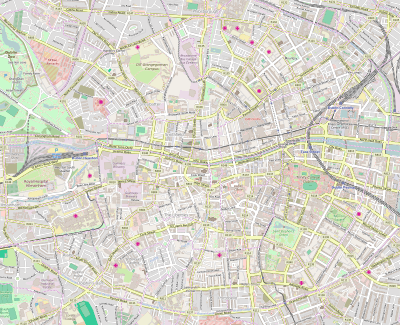Jammet Restaurant
Jammet Restaurant ([ʒɑm.e ʁɛs.tɔ.ʁɑ̃], also called Restaurant Jammet or The Jammet Hotel and Restaurant, was a French restaurant located in Dublin, Ireland between 1901 and 1967.[1][2][3][4]
| Jammet Restaurant | |
|---|---|
 Jammet's on a map of Dublin (second location indicated) | |
| Restaurant information | |
| Established | March 6, 1901 |
| Closed | 1967 |
| Previous owner(s) | Jammet family |
| Food type | French cuisine, haute cuisine |
| Dress code | Formal |
| Street address | 26–27 St Andrew's Street (1901–26) 46 Nassau Street (1926–67) |
| City | Dublin |
| Country | Ireland (Irish Free State, Republic of Ireland) |
| Coordinates | 53.343065°N 6.258923°W |
History
Jammet opened on 6 March 1901 at 26–27 Saint Andrew's Street.[5] It was established by Michel Jammet, nine years chef to George Cadogan, 5th Earl Cadogan, and his brother François. For a long time it was the only French restaurant in the city.[6]
It was mentioned in James Joyce's Ulysses: (published 1922, set in 1904): a stream-of-consciousness section mentions "that highclass whore in Jammet’s", while Corny Kelleher later mentions "Two commercials that were standing fizz in Jammet’s" (i.e. two travelling salesman that were buying champagne).[7]
Jammet's moved to 46 Nassau Street in 1926.[8] In 1928, Vogue described Jammet’s as “one of Europe’s best restaurants . . . crowded with gourmets and wits”, where the sole and grouse were “divine”.[9]
Jammet and his wife ran the French Benevolent Society during the Second World War, and were staunch supporters of the Free French and Charles de Gaulle.[10]
The earliest surviving menu is from 1949; it shows an idea of haute cuisine based on the ideas of Auguste Escoffier.[11]
In 1963 Egon Ronay visited, saying "Space, grace, the charm of small red leather armchairs, fin-de-siècle murals and marble oyster counters exude a bygone age. Ritz and Escoffier would feel at home here."[11]
The restaurant closed in 1967.[9]
Visitors
Virtually every Dublin and visiting celebrity ate at Jammet's at some point. WB Yeats, Lennox Robinson, Liam O’Flaherty, Micheál MacLiammóir, Hilton Edwards and Charlie Haughey were regulars. John Lennon, James Cagney, Rita Hayworth, Danny Kaye, Aly Khan and Orson Welles also ate there.[9][12]
References
- "A Tribute to Jammet's of Dublin | Jack and Jill Children's Foundation".
- "DD012 Jammet's Restaurant | Dublin City Council". www.dublincity.ie.
- Maxwell, Alison; Harpur, Shay (October 20, 2011). "Jammet's of Dublin: 1901 to 1967". Lilliput Press – via Google Books.
- Feigel, Lara (January 17, 2013). "The Love-charm of Bombs: Restless Lives in the Second World War". Bloomsbury Publishing – via Google Books.
- The Irish Times (Tuesday, March 5, 1901)
- "Hotel & Catering Review". Jemma Pub. Limited. October 20, 2005 – via Google Books.
- "Ulysses, by James Joyce". www.gutenberg.org.
- "Restaurant Jammet | Places | Technological University Dublin". arrow.dit.ie.
- McDonald, Frank. "Jammet's: a Dublin treasure crowded with gourmets and wits". The Irish Times.
- "Jammet's Restaurant: French Revolution". Independent.ie.
- https://arrow.dit.ie/cgi/viewcontent.cgi?article=1014&context=jamres
- "Jammet Guestbook..." March 7, 2018.